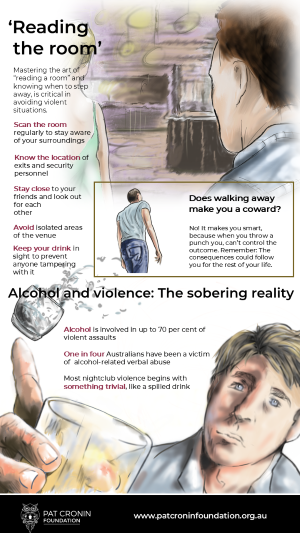Walking away: One of the most important life skills you’ll learn
Do you fight or walk away? Making the decision to walk away will always be the primary solution in avoiding a potentially violent situation.
Sounds easy. Except that it’s not.
The problem is that pride gets in the way.
If you fight, you can’t control the outcome of a punch
One of the major challenges of our Be Wise presentations is changing young people’s mindsets about this very notion – which is why exploring the consequences of violence with them is so important.
Walking away does not make anyone a “coward”.
Think of it like this: If you stay and fight, someone will get hurt.
When you throw a punch, you can’t control the outcome. The consequences of that split second decision can follow you for the rest of your life.
So, here’s a question – Is it worth that risk?
Former nightclub owner and security expert Alan Latu – who is also one of our Be Wise presenters – weighs in with an important message in the video above.
Read the room and stay safe
What if your child asks: “Well, walking away is all well and good. But what about in situations where that’s simply not possible?”
It’s important to stress here that “knowing when to walk away” often starts long before any argument begins.
Encourage them to develop their awareness by paying attention to their environment (“reading” a room) and trusting their instincts.
According to a 2019 Queensland Government study, an estimated 40 per cent of all assaults in Australia occur within “night-time entertainment precincts. The rates of verbal and physical abuse by a person affected by alcohol are more than twice the rate for other drug types. *
Young people, especially those new to nightlife, may struggle with this skill, and alcohol only makes it harder to judge a situation accurately.
Pay attention to the crowd’s energy
Tune into the general vibe of the room. Is the crowd relaxed and cheerful, or are there pockets of tension and hostility? A room where people are laughing, dancing, and chatting is typically safer than one where groups are huddled, whispering, or arguing.
Identify escape routes
In case things go south, it’s important to know where the exits are. In case things escalate, you’ll want to know the quickest way to leave. It’s also helpful to identify areas where security personnel are stationed.
Drink responsibly
Keeping your wits about you is easier if you remain in control. Drinking responsibly and staying aware of your surroundings can prevent you from inadvertently getting into a dangerous situation.
Trust your instincts
If something feels off, trust your gut. It’s better to leave a situation that doesn’t feel right than to stick around and risk confrontation.
Avoid engaging with aggressive individuals
If you notice someone who seems agitated or confrontational, avoid making eye contact or engaging with them. Distance yourself from anyone demonstrating aggressive behaviour.

*Queensland Alcohol-Related Violence and Night Time Economy Monitoring
